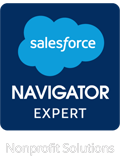What Salesforce Admins and Marketers Can Learn from Each Other
Marketers concentrate on engagement through creative assets, advertisements, emails, and more. Salesforce admins focus on managing data, relationships, reports, automation, and functionality.
And even though these two jobs require different skill sets and have different priorities, there’s a lot they can learn from one another. Let’s talk about what marketers and Salesforce admins have in common and skills they can learn from each other.
What Do They Have in Common?
Salesforce administration is people! But not in the scary, Soylent Green way. And marketing is all about people too.
Shepherding data isn’t the end goal of a Salesforce administrator. It’s making sure that data can be accessed, manipulated, and acted upon by appropriate users. And creating another ad or email isn’t a marketer’s end goal — those are just the media through which marketers engage individual prospects.
For both types of professionals, it’s all about the people on the other end. This commonality forms the link that supports what each role can learn from each other.
What Salesforce Admins Can Learn from Marketers
Mad Men’s Don Draper cut the dapper figure of a marketer who intuitively understood the psychological motivations of consumers. We often think that marketing and psychology go hand in hand. But really, we can boil this down a little: one of the most important traits a great marketer can have is empathy.
What makes a great marketer is not that they can predict a consumer’s response and manipulate people into buying things. A great marketer is someone who can understand and anticipate how someone else will feel and think. What are a viewer’s expectations when they perform a Google search? What makes an email stand out in the inbox? What does someone want to happen when they fill out a form and click a button? Marketers spend a lot of time thinking about perception, motivation, and tone not just to sell a product but to provide consumers with what they need, what they’re looking for.
Empathy doesn’t always come naturally either. It’s a practice that needs to be maintained. You have to spend time thinking, discussing, and be willing to question your previous assumptions.
Cultivating empathy benefits Salesforce admins in two ways. First, being able to understand how a user thinks or feels will help you design a faster, more intuitive app that’s appreciated by your users. This boosts user adoption.
Second, empathy will help connect you with your users when they’re vulnerable and frustrated, which could help make the job less frustrating to you. Think about the user who’s asking for a password reset. Sure, it’s frustrating that this user can’t just reclaim their own password. But consider for a second how they feel — they’re frustrated because they can’t log in and deliver the report their boss just asked them to send ASAP.
If you can harness empathy as you work as a Salesforce admin, users will appreciate both the app you manage and the unique individual behind that app.
What Marketers Can Learn from Salesforce Admins
Ok, let’s flip this around now.
Remember above when I said great marketers are willing to test previous assumptions? Well, Salesforce admins have a lot of experience testing. The best admins are those who are willing to ideate, build, test, and reconfigure. Rinse and repeat.
The goal is to build something that works, specifically something that addresses the need of users in the easiest, most intuitive way possible. That means developing new features, asking users to test those features, and then continuing to develop based on that feature. It’s a cycle.
(We’ve said it once and we’ll say it again: don’t develop directly in production! Use a sandbox.)
Specifically, we call this user acceptance testing (UAT), and Salesforce consultants here at Idealist Consulting spend a lot of time guiding our clients through it. We want to make sure Salesforce works the way our clients expect it to, that it’s easy to use, and that our customizations help our clients do their jobs. In fact, we built a proprietary app called Story Navigator to help our consultants and clients navigate user acceptance testing since it’s so important.
Marketers benefit from adopting a similar approach to testing as they work because, as we stated at the beginning, it’s all about the person on the other end. The best marketers are those who make time to test their hypotheses — color palettes, blog topics, email copy, subject lines, landing page headings, CTAs, etc. And some marketing tools, like Marketing Cloud Account Engagement (powered by Pardot), help you do this.
Testing is important for making the most out of every appeal, every marketing asset, but it’s also about making sure you’re delivering what your audience cares about. Marketers are not psychic — we can’t devine what people are looking for and what’s important to them. We can be empathetic, but empathy isn’t psychic ability. Sometimes we just have to put ourselves out there, test the results, and adjust from there. That means it’s important to know what to test and to make testing and analysis part of your normal operations.
User acceptance testing. Empathy. Like we said at the beginning, it’s all about people, just like the mission of so many nonprofits are.
If you know there’s more you can do with Salesforce for the people you work with and the people your organization serves but you don’t know where to start, check out our guide to change management: “Be Prepared, Not Scared: Strategies for Technology Change”.
















